Please use this identifier to cite or link to this item:
https://accedacris.ulpgc.es/jspui/handle/10553/121960
| Title: | Results on a two-glider mission in the mesoscale eddy fields generated south the Canary islands waters | Authors: | González Ramos, Antonio Juan Rodríguez Hernández, Adriana Mancho, A. Garrido, V. Torres, J. Adler, Leonhard Cabrera. J. |
UNESCO Clasification: | 251007 Oceanografía física 251001 Oceanografía biológica 331913 Vehículos submarinos |
Keywords: | Mesoscale eddies Autonomous Underwater Vehicles Physical and Biochemical Dynamic Lagrangian fluxes |
Issue Date: | 2023 | Publisher: | Servicio de Publicaciones y Difusión Científica de la Universidad de Las Palmas de Gran Canaria (ULPGC) | Project: | Planificación Conjunta, Seguimiento y Observación, Mejora del Conocimiento y Sensibilización Ante Riesgos y Amezas del Cambio Climatico en la Macaronesia | Conference: | VIII International Symposium on Marine Sciences (ISMS 2022) | Abstract: | The physical and biochemical marine lagrangian dynamic generated by a mesoscale eddy field, was examined with two different physical and biochemical autonomous underwater vehicles (deep gliders, 1000m) in the framework of the FLUXES project. Deployments were hold South the Canary Islands waters between the 7th to 25th of July 2017 (435 km,). Langrangian descriptors (M function) were obtained from the 3D hourly current fields (1º/12, forecast +72h) provided by COPERNICUS IBI Regional System, and were integrated between 0 and 500m following the AUVs flying depth ranges. The hyperbolic path planning trajectories along the eddies field was then validated by both Dyna585 (physical) and Bio584 (biochemical) gliders on the ground (CTD, DVL, MR turbulence profiler, O2, Chla, and backscattering). Both AUVs were programmed allowing any bearing angle and integrating each 8 hours (gliders surfacing period), the ground true given by both glider locations each surfacing. Observations revealed the complexity of the vertical structure of the mesoscale eddy fields targeted. This study also highlights the utility of the gliders in support of the development and verification of mesoscale oceanographic features and its biochemical and physical effects in the first 1000m of the water column. | URI: | https://accedacris.ulpgc.es/handle/10553/121960 | ISBN: | 978-84-9042-477-3 | Source: | Abstracts Volume VIII International Symposium on Marine Sciences, July 2022 / coordinación, María Esther Torres Padrón, p. 129 |
| Appears in Collections: | Ponencias |
Items in accedaCRIS are protected by copyright, with all rights reserved, unless otherwise indicated.
